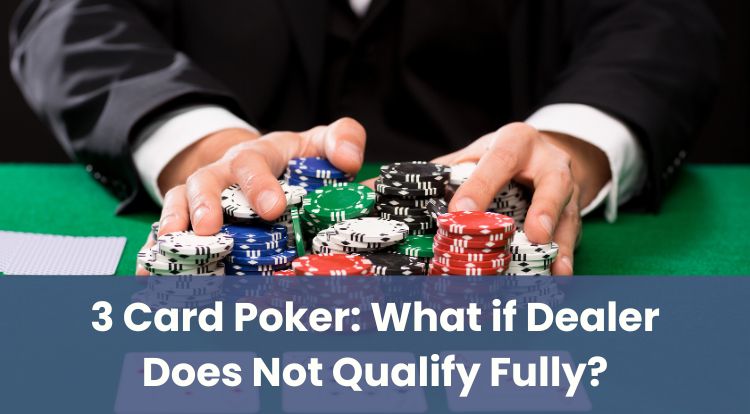
In 3 Card Poker, there are occasions when the dealer’s hand does not meet the requirement to qualify. This affects how the round is settled, particularly for the main bets on the table.
Understanding what dealer qualification means, and what happens when it is not met, helps clarify how the game operates. It concerns how the rules treat Ante and Play bets, rather than just who holds the stronger hand.
Below, we explain what “qualify” means, how it influences your bets and payouts if you choose to play, and whether it changes the odds in any significant way. Read on to learn more.
What Does It Mean When the Dealer Does Not Qualify in 3 Card Poker?
In 3 Card Poker, the dealer qualifies with Queen high or better. This means their highest card must be at least a Queen, or they must hold any higher-ranking three-card poker hand, such as a pair, straight, flush, straight flush, or three of a kind.
If the dealer’s highest card is lower than a Queen, for example Jack high, the dealer does not qualify. When this occurs, the standard method of settling bets changes for that round.
This rule establishes a clear framework for resolving the main bets, regardless of the player’s hand strength.
Understanding the Dealer’s Hand and Qualification Rules
Both player and dealer receive three cards, and hands are ranked according to standard poker order adapted for three cards. A pair beats any high-card hand, a straight beats a flush in most 3 Card Poker rulesets, and a straight flush beats both. Three of a kind is the highest regular hand.
For qualification, the dealer needs at least Queen high. For example, Queen 5 3 qualifies, while Jack 10 9 does not. If the dealer qualifies, the hands are compared for the main bets. If not, special payout rules apply without requiring a direct comparison.
With these basics in mind, the next step is to see how this affects Ante and Play bets at the table.
How Does Dealer Qualification Affect Your Ante and Play Bets?
Dealer qualification determines how the two main wagers, Ante and Play, are settled.
If the dealer qualifies, the player’s hand is compared with the dealer’s:
- If the player’s hand is stronger, both Ante and Play pay even money, and any Ante Bonus pays where offered.
- If the dealer’s hand is stronger, both Ante and Play lose.
- If there is an exact tie, both bets push.
If the dealer does not qualify, the settlement is simpler. The Ante pays even money automatically and the Play bet is returned as a push. No comparison is needed in this situation. Any Ante Bonus for hands such as a straight or better is paid according to the posted paytable, regardless of dealer qualification.
This distinction between qualifying and non-qualifying dealer hands explains why a Play bet sometimes returns without a win or loss.
What Happens to Your Winnings if the Dealer Fails to Qualify?
When the dealer does not qualify, the outcome is straightforward. The Ante wins even money, and the Play bet pushes. This applies whether the player’s hand would have beaten the dealer’s or not. Where an Ante Bonus is offered, it is paid on qualifying player hands, independent of the dealer.
Side bets, such as Pair Plus or 6 Card Bonus, where available, are settled separately using their own paytables. These are unaffected by whether the dealer qualifies, because they depend solely on the specific strength of the cards rather than a head-to-head comparison.
For example, a player holding a flush will see Pair Plus settled on that flush according to the paytable, even if the dealer does not qualify and the main hand is not compared. This separation helps keep the main game and side wagers easy to follow.
Does Dealer Qualification Impact Your Odds in 3 Card Poker?
Dealer qualification influences how often rounds result in a push compared to a clear win or loss. When the dealer does not qualify, the Play bet is returned and only the Ante is paid, so there are fewer losing outcomes on the Play bet, but also fewer full two-bet wins.
This affects the way the game plays rather than the underlying mathematics. The expected return on each wager is determined by the rules and paytables. Qualification changes the distribution of outcomes across wins, losses, and pushes, but it does not create a player advantage. As with all gambling activities, it is important to play responsibly and within personal limits.
If you are familiar with how pushes and even-money payouts function, the flow of the game becomes easier to understand.
Explore Online Casino Games at Slots UK
At Slots UK, we’re a licensed online casino operating under the guidelines of the UK Gambling Commission (UKGC), with clear standards in place for fair play and player protections.
You’ll find a broad selection of games to explore, from popular slot titles to bingo rooms. We’ve designed the site to be easy to navigate, with clear categories so you can move between game types with ease. Payment information is straightforward, and our customer support team is available to assist if you need help using the platform.
There are also account tools available to help you set the parameters that work best for you.
If online gaming is something you’re considering, you’re welcome to explore what we offer here at Slots UK, at a pace that suits you.
**The information provided in this blog is intended for educational purposes and should not be construed as betting advice or a guarantee of success. Always gamble responsibly.
